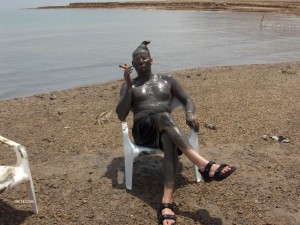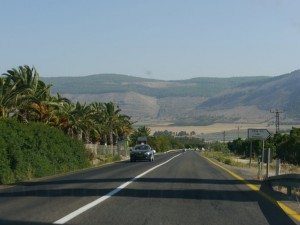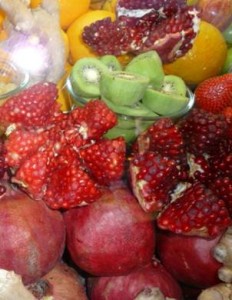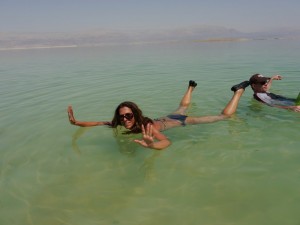My husband Greg enjoying a bit of therapeutic Dead Sea Mud.
Okay, for those of you wondering what kind of a twisted caption I’ve chosen for this entry, what can I say, it’s a fact that Israel still deals with the sporadic bombing of its civilians—a tragic reality. But there is another reality in Israel that is seldom the focus when discussing this region. I have already expounded on the culinary attributes of Israeli food, and the laizess faire attitude toward aging, but recently I have also discovered that the very country, which others might describe as the hotbed for war and political unrest, is one which has slowly taken center stage as a world leader in the revival of ancient beauty and healing practices. It’s a contradictory notion if you ask me, but also one that stems from an inexorable necessity. Where there is so much tragedy, it is necessary to develop and thrive, and prove that politics and tragedy do not define the region, or its people.
Have you ever wondered what King David’s Skin looked like? After reading about the growing popularity of new age beauty and health solutions, based on ancient Hebrew remedies, I believe that David, although a red head, might have had really good skin nonetheless.
Anyone walking through a mall in America has come across an enthusiastic young Israeli who has turned to them and said: “Excuse me mem [sic], where [sic] you from?” Sounds familiar? Well those young men and women have been selling Ahava and Dead Sea beauty treatments for some time now. However, the new brand of products that I recently discovered in Israel are totally different than all the rest. I’m talking about beauty and healing products that have been revived from biblical times; made from plants that are indigenous to Israel.
There are a growing number Israeli researchers who’ve discovered those ancient formulas, and what they’re doing is repackaging them, and introducing them to an already saturated market. However, most beauty products are either entirely synthetic, or have at least one or two unhealthy ingredients in the mix, or are basically completely ineffective. This new brand of products, however, is made from completely natural ingredients.
The Galilee, Israel.
Merapeh Habosem (in English they call themselves Simple Natural), is the name of a company that specializes in ancient Hebrew remedies; their factory is located in kibbutz Cabri in the Galilee. Their chief herbalist, Mr. Shimon Shelma, has studied the properties of over 500 plants and trees, many of which are currently used in their serums, shampoos, soaps and ointments. By using homeopathic techniques, he creates recipes for the hair and skin by using plants and trees mentioned in the Bible and Talmud. He uses things like, etrog (citron) myrtle, sage, bay leaves, tamarisk, willow, oak and pomegranate. Last year, I actually ordered myself some etrog oil; I use it sparingly on my face and I have to admit that I absolutely love the results. It helps me control some dark spots on my face, and overall, it provides me with a very healthy looking complexion. I also bought some pomegranate seed oil from Israel and this too makes my skin look very healthy and clear.
The beautiful Israeli pomegranate.
Herbs of Kedem, located in the Judean desert, specialize in plants cultivated in the dunes located between the Dead Sea, the lowest place on earth, and the cool Hebron Hills. The research conducted by Dr. Nissim G. Amzalleg, the company founder, has shown that these plants contain compounds that allow them to adapt to the harsh and extreme climates of the region. He states that if these plants can regenerate themselves effectively then they would have a similar effect on humans. In fact their products have already proven their magical qualities; they’ve successfully treated nail fungus, psoriasis, dermatitis, acne, scars and hair loss. They are sticklers to maintaining a product line which only uses natural products—nothing synthetic. For instance, when it comes to moisturizing creams, they are created by bonding oil and water—an unstable compound which requires preservatives to ward off bacteria. Herbs of Kedem offer an alternative solution to regular moisturizing products by using different essecial oils instead.
“The benefit of using plants for skin care is that they are environmentally friendly. Plants produce chemicals in a clean manner, without polluting the environment, without emitting toxic substances, they work with enzymes that do everything in a sophisticated way,” said Dr. Amir Kitron, CEO of Herbs of Kedem, in an interview for an Israeli paper.
In Afula, Moraz Galilee Medical Herbs specializes in the polygonum plant, which is abundant in the region. What’s great about it is that it contains natural anti-oxidants and anti-bacterial compounds that repair tissue and promote the healing of wounds. This plant is found in other parts of the world, but only the strain grown in Israel has the higher healing properties due to climate, atmosphere and the minerals in the Galilee soil.
One dip in the Dead Sea and feel the difference on your skin.
Israel proves once again to be the land of milk and honey. A region riddled with war and pain has reinvented itself by promoting healing and beauty. The next time I visit Israel, I will be sure to plan differently; I plan on visiting these companies to learn more about their products, and replenish my stock of beauty supplies. I may have less room in my suitcase for chocolates and candy, but heck, sometimes the need to maintain nice radiant skin overpowers my desire for sweet tasting goodies. I can always drive to LA for that other stuff anyway—not as fresh—but still available to Israelis who always reminisce about flavor and taste.
If you have enjoyed my writing and interpretation of ideas, then be sure to check out my books. I thank all of my subscribers for loyally reading my material and giving me a greater sense of purpose.




Very interesting article.Can I get the creams on line?
Yes, I believe that you can order some things online. I have done so myself with at least one of the companies that I’ve mentioned above: Simple Natural.